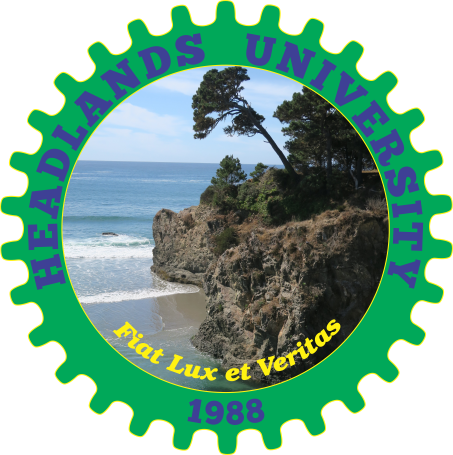With reluctance I revisit this article, written in a previous millennium (1999). I have lightly edited it; mostly, reframing it in modern web terms to make it easier to read in 2018. SO much has changed! (and so much remains the same...)
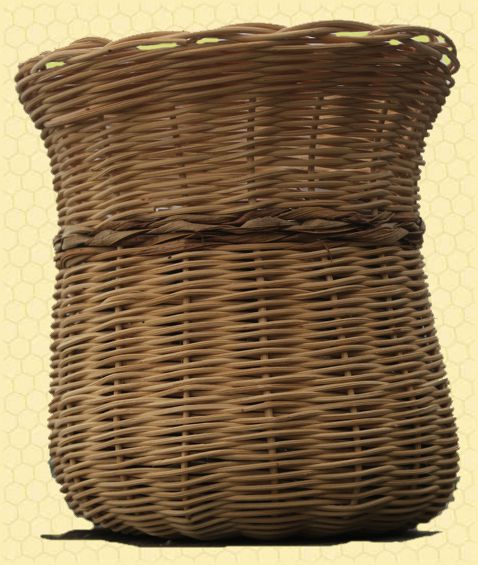
Basket weaving is america's original technology. As long as our things proliferate and wander, we need this gentle organizational tool. Starting with mindful harvest of the grasses, reeds and willows, through the contemplative patterning and plaiting, from the beginning of human reckoning in these parts, baskets contain the best and most lasting bits of our culture.
Solar architect Steven Strong defines sustainability simply: that we may keep on doing what we keep on doing. Yet how can we be sure that our actions and means are sustainable? In less than a lifetime, DDT has won a Nobel prize for its contribution to human health, and then been banished from our continent as a major environmental threat. Nuclear energy, that my generation was told in grade school would provide infinite, safe, cheap energy, now promises merely complexity and millennia of risk.
Welcome to an experiment in hypertext. This font is meant to define terms and proclaim prejudices. Seems to me, if you have a wonderful palette (and HTML is certainly that!) why not use it as well and intricately as possible? before resorting to Java, graphics that take hours to load, yada yada yada (as Bush 43 liked to say.) After all
- we are a literate mob, and
- the intricacies of the medium are more intriguing, say, than a one-way medium like television.
The Pomo were the first people living across the coastal ridges of northern California, where the Solar Utilities Network makes its home. We wonder constantly what they knew about living well with this land ...and suspect we are becoming more like them every day. The land is indigenizing us. Sadly, though, their special knowledge has been lost.
American : one often misused word. Does it mean citizen of the US? or resident of one of the countries on one of the Americas? Canadians, Mexicans, and Chileans all grit their teeth when dumb USers say, “That’s not the way it’s done in AMERICA.” Personally, I have come to feel that nationalism in general and US-jingoism in particular is cause for shame. Our planet is too small for such prejudices. I am proud to be Gaian. My belligerent fatherland continues to embarass me through short-sighted decisions, policies, incursions, and tail-wagisms. As a Californian, [and never, in 1999, having been there] I am similarly disenchanted with europe. I was greatly relieved to discover that folks in other countries consider americans as distinct from their government. Maybe it says it’s of, by, and for the people, but it hasn’t acted that way in decades. As far as I can tell, it and most developed nations are of, by, and for corporations, which are the dangerous new life-form on the block. We would be better off without them.
Anyway, the word hasn’t earned capitalization, in my view. You may spell it anyway you like.
 Much more about Steven Strong’s work with roof-integrated solar panels and with sensible energy strategies can be found at his website.
Much more about Steven Strong’s work with roof-integrated solar panels and with sensible energy strategies can be found at his website.
DDT is considered one of our most dangerous endocrine disruptors. More on this topic may be found in a report of an international consensus, but in summary, DDT, apart from its known devastating effects on the eggshells of raptors, is also implicated in a number of human health problems from low sperm motility to increased cancer rates.
After more than a century of global industrialization, scientists assent to three observations:
- Everything spreads, but nothing disappears.
- Quality rests in structure and concentration.
- Green cells are the only significant net concentrators and producers.
Sustainability appears to occupy the terrain bounded by three principles:
- Thrive on Current Solar Income
- Create no waste
- Encourage diversity
- Substances from the earth’s crust must not be systematically inserted into the biosphere
- Substances produced by society must not be allowed to increase systematically in nature
- The physical basis for productivity and diversity must not be allowed to systematically deteriorate.
Current Solar Income means the energy that falls on us on a daily basis. This turns out to be an enormous amount of energy, nearly a kilowatt per square meter at temperate latitudes. It can be harvested directly using photovoltaic panels (which are only about 15% efficient) or stored as heat in hot water. Plants are the most efficient converters, using photosynthesis to convert sugar into food and biomass. For the purposes of this article, current can be taken to mean this year, so shortfalls in winter can be met with summer’s stored abundance. Biomass fuels – firewood – regenerate quickly, and are considered current solar income. Fossil fuels, which require hundreds of millions of years and special circumstances which may never again occur on this planet, are not income, but an inheritance; burning them is the equivalent of squandering a fortune.
Substances from the earth’s crust: petrochemicals, asbestos, uranium, chromium and the other heavy metals, mine tailings of all kinds, and the chemicals associated with extracting, purifying, and refining these substances... the list is endless, but suprisingly, the bulk of this damage has taken place in the 20th Century.
Substances produced by society which never before existed in nature, or existed in small quanities, and which are slow to decay. Plastic is a simple example, but some of the organics are the worst of this breed. According to Theo Colborn, senior program scientist, who manages the Wildlife and Contaminants Program at World Wildlife Fund, “Everyone of you [reading this] is carrying at least 500 measurable chemicals in your body that were never in anyone's body before the 1920s.” Is it any accident that in the same period of time, a whole new class of illnesses and diseases has appeared among us?
The physical basis: in a word, Nature. We are familiar with the loss of forests generally and in recent decades the rain forest, but the loss of tidelands, wetlands, grasslands, riparian margins, and the devastation of most of the other habitable or tillable land is even more cryingly important. From an ecological perspective, humanity has become a disease which has attacked the natural order, primarily with its heedless and arrogant assumption that all is here for our use. Many who subscribe to the Gaian Hypothesis expect that the Greater Organism will protect itself by shrugging us off like we shrug off a troublesome parasite. Of course, to us it won't feel like a shrug...
These ideas seem to be the perimeters within which every life form on the planet exists ...save one: us.
No matter how completely our lives rely on industries based on extraction of fossil fuels, we must grapple with the fact that we are poisoning our planet. Industry's strategy -- heat, beat, and treat -- is primitive compared to the subtle energy-efficiency of photosynthesis. There can be no doubt that such primitive methods waste at least half the energy consumed; when we compare modern products -- a plastic container, for example -- with a more natural substitute -- a Pomo basket -- we might reckon that nine parts of energy out of every ten consumed are squandered while producing an inferior product. Surprisingly, this is good news. If we waste so much making drek, we need only attend to efficiency and quality in order to secure a good life within sustainability's perimeters.
the Hannover Principles
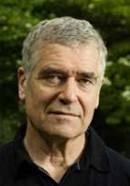
The foregoing observations and prohibitions were carefully explored by Karl-Henrik Robèrt, a Swedish oncologist who elicited the precepts through an exhaustive process of consensus-seeking among a large group of scientists. I should note that he adds one further ‘rule’ – We need fair and efficient use of resources to meet human needs – with which I certainly agree, but for which I cannot make a case as an essential tenet of sustainability. The principles are adaptated from William McDonnough's ‘Hannover Principles’.
drek: (Yiddish, taboo) “Human dung, feces, manure, or excrement; inferior merchandise or work; insincere talk or excessive flattery” -- A Dictionary of Yiddish Slag & Idioms
Walk with me, out gathering basket materials. Walking in the probable footsteps of a gatherer from an earlier millennium, we find hardy native plants mixed with aggressive exotics which would surprise our predecessor: hardy asian immigrant periwinkle adds a lithe, verdant accent to the light golden native reed. One fundamental measure of land is the indigineity of its life-forms: how much of the local flora and fauna have been there for a century? For a millennium? In Caspar, as in much of the United States, the fraction ranges from half to less than a tenth, since most of the biomass has been around for less than a thousand years; most of the change has taken place in the last hundred years, a staggering, unprecedented change in biological terms. Look around you: how many of the prevalent species are actually from another continent, bioregion, or watershed? This leads us to questions: Are these good changes? How will they be continued, or reversed, if we and our ancestors are to live here for another millennium? We enter a heady, challenging time of many questions.
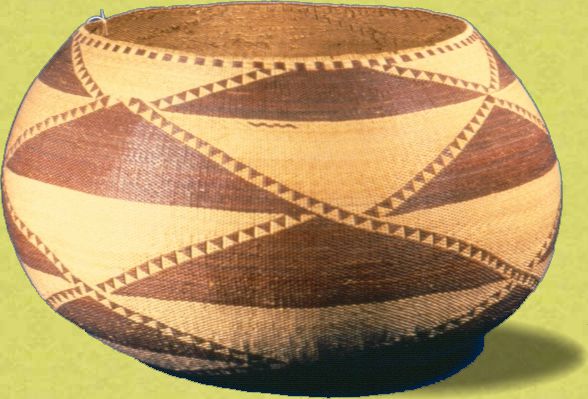
indigeneity: the fraction of indigenous species amongst all surviving life forms. In land undisturbed for centuries -- if there were such a thing! -- the fraction would be 100%; in a botanical garden, it might be only 5% -- the stubborn weeds. This measure is more interesting when applied to flora, because in fauna there is generally a great diminution -- loss of biodiversity -- within the last century for ALL species.
Are these good changes? Take Eucalyptus, for an example. Please! Introduced in the first part of the century around the globe by get-rich-quick greed-heads (its only claim to fame is it grows fast) eucalyptus has gotten out of control. [update:] Where once we were told it was virtually ineradicatable due to hardy roots, experience has taught us that mature root systems are less likely to resprout, and a diligent program of breaking off the resprouts over a period of years ends the plague. Nevertheless, Eucalypts are allelopathic, meaning they poison the ground for any other life forms, including animals. It is a terrible fire and freeze hazard, even in its native land. It has no natural predators to keep it in check. Its wood is 'cross-grained', which means that if it isn't sawed or split within days of falling, it becomes uncuttable, and since nothing eats it, it takes years to decay. Agencies like the California State Parks system, who value indigineity, are spending millions to get rid of this plague. The answer, unfortunately, is that with very few exceptions, introductions are very damaging when allowed to escape into the 'natural' environment.
Who among us has time to learn to weave baskets, then to weave all those we need? Harvesting, considering next year's harvest as we go, being sure to leave enough of each plant for future harvests... to do this well, we must learn the habits of the plants and the web of life which relies on them. In this swift-paced modern world, who can find time for such a study?
Time, curiously, has become one of our most precious and endangered resources. It is also the essence of sustainability. If we are in a great hurry, as we seem to be, to exhaust the planet's resources while bringing the carefully sequestered hydrocarbons back up out of their safe hiding places to choke the atmosphere, we will surely not have time to play with our children, dig in our gardens, care for our neighbors, or learn to weave baskets. Embedded deeply in a mechanistic, materialistic, dehumanized culture, we are completely surrounded by people who have made the same choices: to bruise home and family in favor of wealth.
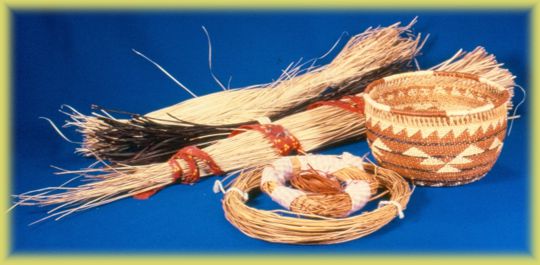
“In order to make a basket it takes a year of preparation. The basket maker has to go out and cut back the sedge, willows, and other plant materials they are going to use. Certain songs have to be sung when asking the plants permission to use them. Good thought have to be present when taking care of the materials. Everything that you do is a reflection on you and how your basket will turn out.”
| Nature can take care of our needs, but not necessarily our greeds. -- Gandhi |
Our collective wealth is nothing more than a remnant of the richness humans have extracted from the planet, yet our means for accounting value and success are seriously out of date. At the dawn of the industrial age, capital was rare, resources were abundant, and most 'civilized' humans were hardly better off than slaves. Return on investment was enshrined as the measure of benefit, the bottom line ...and there is no doubt our 'standard of living' has improved. Now, barely a century later, capital is abundant and humans may live better, but resources are becoming frightfully scarce. While Rome burns anew, accountants (our tribal storytellers) still tell tales which treasure capital and urge exploitation of nature. We are not the first culture or species to encounter such a dramatic turn of values, but many among us believe we are the first species to be faced with the unbearable opportunity to revise our means and lifestyles to avoid extinction.
| To get the most while giving the least is unethical, anti-social, abusive and in fact is the evil at the heart of predatory commerce. -- James Hillman's Kinds of Power |
accountants (our tribal storytellers) : I am indebted to Dee Hock, founder of Visa International and the chaordic principle, for this insight. Think about it: the way we evaluate the goodness and success of an enterprise or a person or even an idea is by 'bean counting.' "How much will it cost?" and "How much does she make?" are, too often, our first questions, not "over its life, who will it benefit?" or "is she happy?" Our near-sighted time frame, artificially shortened by these storytellers to the next quarter, the fiscal year, obscures our vision into the future. Executives make decisions about forests which take centuries to regenerate based on their need to show a profit in the next quarter. The devices accountants use to tell these dramatic stories -- junk bonds, derivatives, interest, future value -- are as arbitrary and fictional as those of renaissance jongleurs adjusting fact and timing to suit rhyme and dramatic effect.
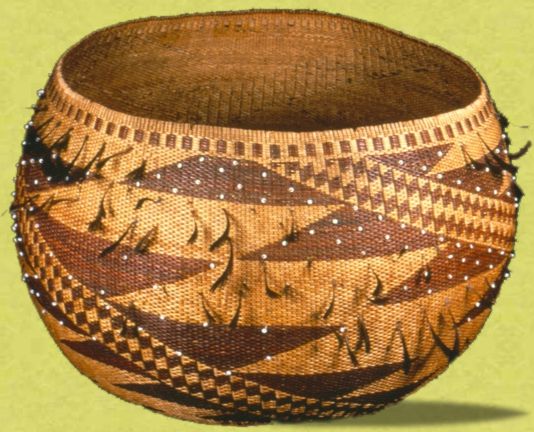
When we contact other cultures, as in developing countries, we are generally harsh in our judgment of our hosts' lackadaisical attitudes toward time and wealth. It is easy to see that the conquistadores of earlier centuries wrought evil in their zeal, but is it possible that our enthusiasm for 'civilization' (as we define it: democracy, cars, TVs, and fast food) is even more wrongheaded and evil? Having accepted Haolewood values in our own lives, are we sure that they serve us so well that we feel good imposing them on other, more ancient, earth-rooted cultures? Or is our cultural zealotry based on the principle that misery loves company, especially if we can turn a profit thereby?
Haolewood: the Hawaiian term for white interloper is haole. The kama'ainas -- literally, people of the land -- grin and giggle when haoles build their new england style settlements and live their mainland lifestyles in the midst of the garden of earthly delights; they call these forlorn and dysfunctional settlements Haolewood.
Before industrialization swept the globe, indigenous peoples, like all natural life forms, lived in perfect dynamic harmony with their environment. When a vine was taken for a basket, words of thanks were given. Wonderingly, we say, "They use everything they take!" but this misses the deeper, more meaningful truth: they take only what can be immediately used. We great-grandchildren of dominion can scarcely imagine a time before garbage. In our lives, as in any closed system, we must find time to deal with the inescapable fact that waste is not sustainable. No other species has ever created waste. To survive, we must get back in step with every other living organism by acknowledging that we do not own the world, or even a tiny part of it; like all other living organisms, we are infinitesimal (although infinitely valuable) parts of a magnificent whole.
| Nature bats last. |
dominion: the quasi-religious and wholly wrongheaded (in my view) doctrine that the earth is here for us to use, to own, to sacrifice and subjugate without a thought for the future, even for our future generations. This toxic perversion, generally blamed on the Bible, has flowered in our lifetimes, and now offers Gaia an excuse for expunging us in favor of less greedy and short-sighted life forms.
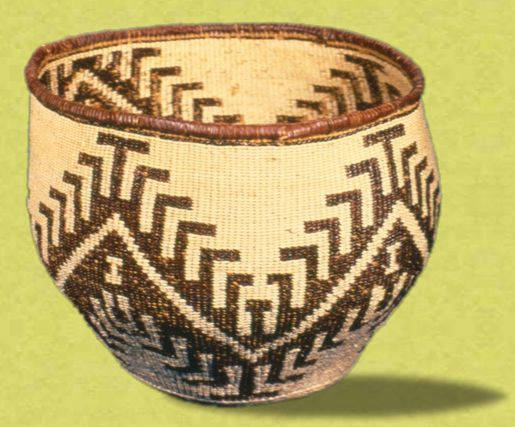
A new basket grows organically in our hands: we bend and weave wet reeds with our clever hands, and order emerges. The shapes are curved, human, pleasing, the texture benign and familiar. There is much room for practice and for art. A well-woven basket made from the right stuff holds water, and can be used for cooking. With only slight changes in material and technique, this flexible technology, weaving, can produce clothing, shelter, games ...all the essential human necessities and delights. The finished work is pleasing beyond any mechanistic definition of function, conferring on maker and user alike a heightened sense of participation in the planet's greater web of life.
We need baskets now more than ever; in them we find a metaphor for our noblest inter-relationship with all the life on our planet.
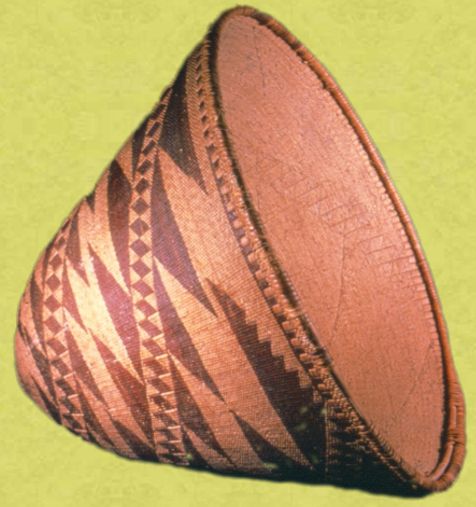
I was glad to learn from my Shorter Oxford English Dictionary that Hedonics is the science of human pleasure. I wonder why no one ever told me before? Now, at last, I know what I'm doing! Getting from here to a sustainable life while holding our hedonics at a satisfactory level is not going to be easy. My friends and I have compiled a very preliminary list (which follows) of some of the transitions from unsustainable to sustainable which now face us. Your additions are welcome.
Please note, the following is not a black/white comparison; we do the things listed below to make life more pleasurable. While considering some of these items, like hunting and second homes, it is important to remember that the left-hand column is not judged to be wrong or unpardonable: items in the left column feel good and in some cases even offer folks their clearest insights into the importance of sustainability. Nevertheless, we must recognize that, for one reason or another, these behaviors are simply, regrettably, no longer sustainable. The time has come for us to evolve beyond our selfish wastefulness and wean ourselves toward the more responsible activities of a mature species. I am deeply pained by the unsustainability of my own chocolate addiction, and pray with Saint Thomas for relief “...but not yet!”
hedonism: “The doctrine or theory of ethics in which pleasure is regarded as the chief good or the proper end of action.” [Oxford English Dictionary] The activities or ideas in this list presumably bring pleasure, but some cannot be sustained without damaging our planet. The point of this exercise is to show that precious few truly worthwhile ‘pleasures’ must be abandoned for us to live well; there's a sustainable pleasure right next door.
hedonics: “the science of human pleasure”
“sustainable” life: This right here is the biggest editorial change in my thinking since 1999. I think the Sustainability Train sailed about a dozen years ago. If We the People had globally committed to immediate action to counter Global Weirding, and executed on it in full Emergency Mode – a super-Manhattan Project for GOOD – we might have cleared the wall. In almost-2020, that wall is entirely too close, coming too fast. It's about Resilience now. Resilience in the face of unpredictable yet inevitable rapid change. If I think like this very long, I start feeling very apologetic toward my grandchildren.
Global Weirding: This is the biggest factual change since 1999 ...or, more truthfully, factual realization Picturesuely but inaccurately termed Global Warming, this 'round-the-world phenomenon makes dryer places dryer, colder places colder, wet places wetter, windy places windier, and so forth through just about every weather metric you can name. The livable atmospheric envelope we inhabit is getting warmer faster than ever before. Warmer air holds more water, and what goes up (into the atmosphere) must come down (as precipitation.) Taken together, ambient temperature and humidity are the engine that drives weather and, in time, climate. You knew all that ...but chances are you were just beginning to think about it in 1999.
It is well worth noting that some of the following 'unsustainables' can be converted to sustainability quite easily, simply by changing the consciousness or motive power behind the activity. Some will be much tougher. When we find an object or behavior whose principle purpose is to garner profit or solve a problem for its purveyor -- for instance, 4WD vehicles for folks who seldom or never leave the pavement -- the transition may be joyous. Like the pioneer heroes in my book who live 'under their own power', those who undertake a more responsible life report that they find themselves richly and unexpectedly rewarded by their reconnection with the values and awareness which inform every other species participating in the grandeur and rightness of nature.
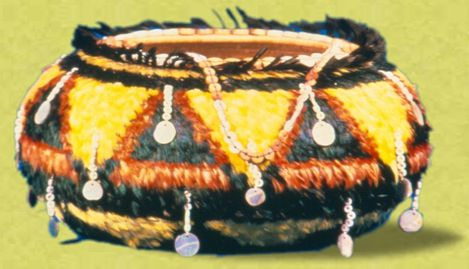
I invite you to consider these hedonisms; how can we move our weight toward resilience?
Resilience continued: The wall referred to above is the onrushing tipping point where life on planet earth starts getting really grim. Assuming we manage not to flame out in nuclear apocalypse, my generation, one of the two that have done the most damage, will probably stop living about the time the wall becomes the biggest reality in life. I hope we can remember that life relies on a diversity of living creatures.
find their explanations at right and below.
H E D O N I S M S | |
unsustainable |
sustainable |
| plastic containers | baskets |
| lawns golf courses |
volunteer grass mowed with a push-type or solar powered lawnmower better: let the grass grow for the bugs and birds |
| gas & diesel automobiles | “God’s Car”: walking public transportation human powered vehicles hybrid vehicles |
| jet airplanes | solar-powered trains wind-powered ships & boats |
| cruises ski-lift downhill skiing |
hammocks snow shoeing |
| leaf blowers | rakes and brooms |
| many children | one child |
| fast food | home-grown food raw organic food |
| factory farms | community gardens |
| mono-cropping ‘corporate’ farming chemical agriculture |
companion planting family farming kitchen “victory” gardens |
| pesticides | integrated pest management |
| meat as a principal protein source |
beans and rice soy products |
| food preservatives and stabilizers packaged foods |
local produce whole foods, mostly plants |
unsustainable |
sustainable |
| supermarkets malls centralized economies |
farmers markets craft fairs local barter economies |
| fur clothes (except for subsistence hunters) |
wool clothes many layers |
| machine made | hand made |
| exotics imports |
natives domestic products |
| extracted materials: plastic, metal petro-chemicals |
grown materials: natural fibers and biomass |
| asphalt roofing vinyl floor, carpet |
clay and metal roofs wood, tile, linoleum |
| fossil-fuel powered HVAC | super windows excellent insulation natural ventilation biomass heating |
| electric or gas-fired hot tubs | wood-fired and/or solar-heated hot tubs |
unsustainable |
sustainable |
| allopathic medicine drug therapies |
integrative medicine eclectic, nutrition-based, & preventive strategies |
| maximized income | optimized income |
| multinational corporations “Corporations are people” stock markets |
home-town business local investment |
| absentee ownership second homes |
local ownership first homes that work |
| extremism competition |
moderation cooperation |
| contact sports trophy hunting fossil-fuel powered “sports” |
'personal best' games wildlife viewing human-powered play |
| rigid top-down persistent patriarchal |
flexible self-organizing biodegradable adaptive |
| warfare militarism nationalism |
friendship diplomacy brotherhood stewardship |
| hate meanness |
love kindness |
unsustainable |
sustainable |
find their explanations below and at right.
Lawns and golf courses require prodigious amounts of chemical intervention to achieve the correct degree of homogeneity. Maui County in the state of Hawaii, which “enjoys” the largest acreage of golf courses per capita in the world, also enjoys a devastated inter-tidal zone and fishery, because of all the chemical run off from this peculiar form of agriculture. Furthermore, lawns require mowing, usually with two-cycle infernal combustion engines, the most polluting type of petroleum burning known.
Volunteer grass is what just pops up most places when there’s enough water and warmth. Most folks call this ‘weeds’ but if you mow it, the ‘weeds’ that tolerate having their heads repeatedly cut off -- mostly grasses -- make a pleasing green patch. We mow just enough for a good summertime frisbee pitch.
“Above all, do not lose your desire to walk. Every day I walk myself into a state of wellbeing and walk away from every illness. I have walked myself into my best thoughts and I know of no thought so burdensome that one cannot walk away from it... But by sitting still, and the more one sits still, the closer one comes to feeling ill... If one just keeps on walking everything will be all right.”
“Hybrid vehicles will combine...” this 1999 entry began, quoting Reinventing the Wheels by Amory and Hunter Lovins. “These sprightly little cars will probably still have a little gasoline-powered generator on board, running at peak efficiency only when the batteries need recharging.” Got that right on the nose! In 2018 we're driving a plug-in hybrid, and 60+% of our driving is solar-powered electric.
One child: Common sense tells us that our planet is overcrowded with people, but we cannot seem to bring ourselves to the next logical conclusion. If we can, in our generation, let every woman coming to her child bearing years, know that she has the right to decide how many children to produce ...and from the global perspective, just ONE (or fewer) is OKAY. If we could reduce the population load by 50% or more each generation for a century or so, we would have happier children and a more stable planet.
Two quibbles: In most developed countries, the birthrate is close to two; it's in the developing countries where families are larger, so why should we change? Simple: because we consume so much more, perhaps 80 times as much as a Bangladeshi.
How will we protect girl children? asks my eldest daughter just leaving her childbearing years. [Now THAT is another big change since 1999!] Still a good question. The cold-hearted answer is, that problem will take care of itself. Still, a generation later, in many places, even including our own continent, too many people consider that girl children are not enough, and terminate their child-making only when they get the boy which “insures the continuation of their family name”. What selfishness!
Factory farms are just another way for corporations to extract the richness of the earth. They do this with little or no thought for future generations, only next quarter's bottom line ...and the land suffers. Loss of topsoil may be, after overpopulation, the greatest threat facing us in our time, and most of this loss is due to corporate agriculture.
Mono-cropping: planting a large acreage in a single crop, be it corn or pine trees. The timber industry proudly trumpets its 'tree farms' but these lifeless places bear as much resemblance to a forest as a deck of cards does to a Shakespeare comedy.

Companion planting: certain plants thrive in each others' company -- redwoods and rhododendron. Carrying this principle to the kitchen garden works much better than the mass-production monocropping approach, we find.
Integrated pest management uses physical and biological, rather than chemical, measures to keep crops healthy. In Caspar, the largest fraction of our IPM strategy is removing the snails by hand and throwing them to the cows. Ick -- but somebody's gotta do it. Sure beats biocides. Chickens are better.
Meat: The way agribusiness grows meat consumes huge amounts of water, petroleum, and uses large amounts of synthetic hormones (aka endocrine disruptors). Farm animals have their place, but we don't need to kill them to use them well.
Food preservatives and stabilizers prolong shelf-life, a boon to manufacturer and distribution chain, but no favor to the consumer. They want us to eat this drek?!? There is an abundant literature about the effects of these chemicals and human development and behavior. For a brilliant commentary on this and other favors we do the chemical industry to our detriment, I refer you to RACHEL'S NEWSLETTER.
Exotics: exotic species, plants and animals from other places. The mosquito was not native to Hawaii; its progenitor emigrated via jet airplane. Hawaii is a unique laboratory for the study of the struggle between indigenes and invaders, but we all feel the unintended negative effects of globalization. We can start being headier in our importations.
asphalt roofing: a classic of marketing! Starts as a toxic waste, but the refinery owner has a better idea! Mix it with gravel, and get people to PAY HIM to dump it on top of their houses! Very poor durability, and a constant source of low levels of toxics onto the grounds around the house; not suitable for rainwater catchment. A nightmare to remove. A really bad idea ...unless you own a refinery.
Allopathic medicine responds to illess and disease (that's the path part) without much regard for healthy living and prevention. It works miracles, especially in the face of trauma -- too often, these days, due to unsustainable practices like fast automobiles and sloppy use of dangerous chemicals.
Second homes, according to William McKibben in Hope, Human and Wild, are only necessary when the first home is not working. When half the world lives four to a room, we really don't need to make this kind of statement.
Contrary to popular opinion, competition is not natural, although its champions say it is instinctive and pervades nature. If you look for trouble, you'll find it, and they did. New-found evidence for cooperation is much more convincing, and calls into the question the way we allow our minds to be swayed by special interests masquerading as scientific truth.
Fossil-fuel powered “sports” have wrecked nature, and are prolifically consumptive and polluting. Thumbs down for sustainability. Furthermore, howzit that a fast car or a funny truck are a sport? Jet skis and snowmobiles are an abomination except when used for a legitimate transportation purpose, although a canoe and a horse are probably more resilient going forward.
meanness: In 1998, a student was asked at lunch what he felt returning home after six years in europe. He looked thoughtful, then sounded sure: “Meanness,” he said. “Americans have turned into a mean people.” And I perceive it's true. To acheive sustainable life, we'll be increasing our practice of random acts of kindness. When I can do that, it feels good. Hedonistic? For sure!
In 2018, Donald Trump is turning meanness into an American Characteristic. Aren't we proud to be USers?!?
I have no problem enjoying machine made stuff; I'm writing this, and you're reading it, with a computer. Incidentally, isn't that a delightfully sustainable exchange? No electrons were hurt during the making of this publication. But there are many machine made products which are destructive, and many more where the benefit to the final holder is less than for the lengthy distribution chain -- and that is not sustainable. Does it make sense to drink water from France?
Natural fibers like kenaf and hemp are better than tree fiber, and much more sustainable. The hemp story is especially tragic: we are deprived of a wonderful gift from our planet by the greed of a few fearful men. That was then; this is now: let us legalize the benefits -- principally fiber, oil, and surcease from pain --while we quarrel about recreational drugs, including caffeine, nicotine, and alcohol in our deliberations...
HVAC: Heating, Ventilation, and Air Conditioning. Jargon is a useful device for keeping the uninitiated from understanding the otherwise simple-minded work of the various priesthoods like architecture, engineering, and medicine. Is jargon sustainable?
Think of a window as an appliance providing heat and light. Super windows use the best technology to work better, letting in heat and keeping it. Single-pane glass is a costly energy-burner in most of the US, and RETROFITTING makes as much sense as replacing a fuel-inefficient heater or refrigerator. Any window better than R-6 (six times better than single-pane glass at R-1) is a net producer.
Integrative medicine attempts to bring together the best of all medical practices, including allopathy, herbal remedies, body work, healthy living, enhancement of the healing process ... sounds like a sensible notion to me. For more, follow the work of Dr. Andrew Weil.
Optimizing income is an alternative to the more conventional “More Is Always Needed” approach to finance, on a personal or corporate level. This is a revolutionary notion: there could be enough! The optimum is generally less capital intense, as well as more mindful of sustainable values. It requires a great deal more consciousness. Jonesing for that new unbelievably fuel-inefficient 4WD Urban Insult Vehicle is easy.
Diplomacy: Here's a shift in my thinking since 1999, when this appeared in the left column. I have learned a lot since 1999 about other places on the planet; in 1999 I had never been to Europe. Now, in 2018, watching the systematic demolition of the U.S. State Department in a dangerously wrong-headed notion that you can run a giant nation the way you run a penny-ante real estate “organization,”, I see (1) that every civilized nation relies first on diplomacy, and resorts to violence and warfare only as a last resort, when diplomacy fails.
Love & kindness: We all could use more of that right now.
originally posted 29 August 1999 : 18:52 Pacific time
Newly edited version posted 22 May 2018 : 17:22 Pacific time
© 1998-2018 Michael Potts for the Caspar Institute. All Rights Reserved.
printed with 100% recycled electrons!
i_site called by susthedo
cn2db7: Connected successfully
pgsql: SELECT * FROM `pages` WHERE `ordr`>0 AND `ordr`<5 ORDER BY `ordr`
prg, mn name: susthedo, index
prg, mn name: susthedo, clb_curwork
prg, mn name: susthedo, mrp_curwork
prg, mn name: susthedo, SUN_curwork
prg, mn name: susthedo, booklist
prg, mn name: susthedo, rules
prg, mn name: susthedo, guests
prg, mn name: susthedo, aboutus
prg, mn name: susthedo, ParticleWave
prg, mn name: susthedo, resources
* 1 pgid:
ip: 3.12.146.153
memsql: SELECT * FROM `members` WHERE `ip`="3.12.146.153" ORDER BY `visits` DESC
memctr, mem-id: 0,
* 2 pgid:
visits upsql: INSERT INTO `visits` SET `ip`="3.12.146.153",`memid`=,`visitdt`="",`pages`="",`totpages`=1
visit insert PROBLEM: INSERT INTO `visits` SET `ip`="3.12.146.153",`memid`=,`visitdt`="",`pages`="",`totpages`=1 edchk! ,
i_hdr called by susthedo
i_ftr called by susthedo - mem_init:
